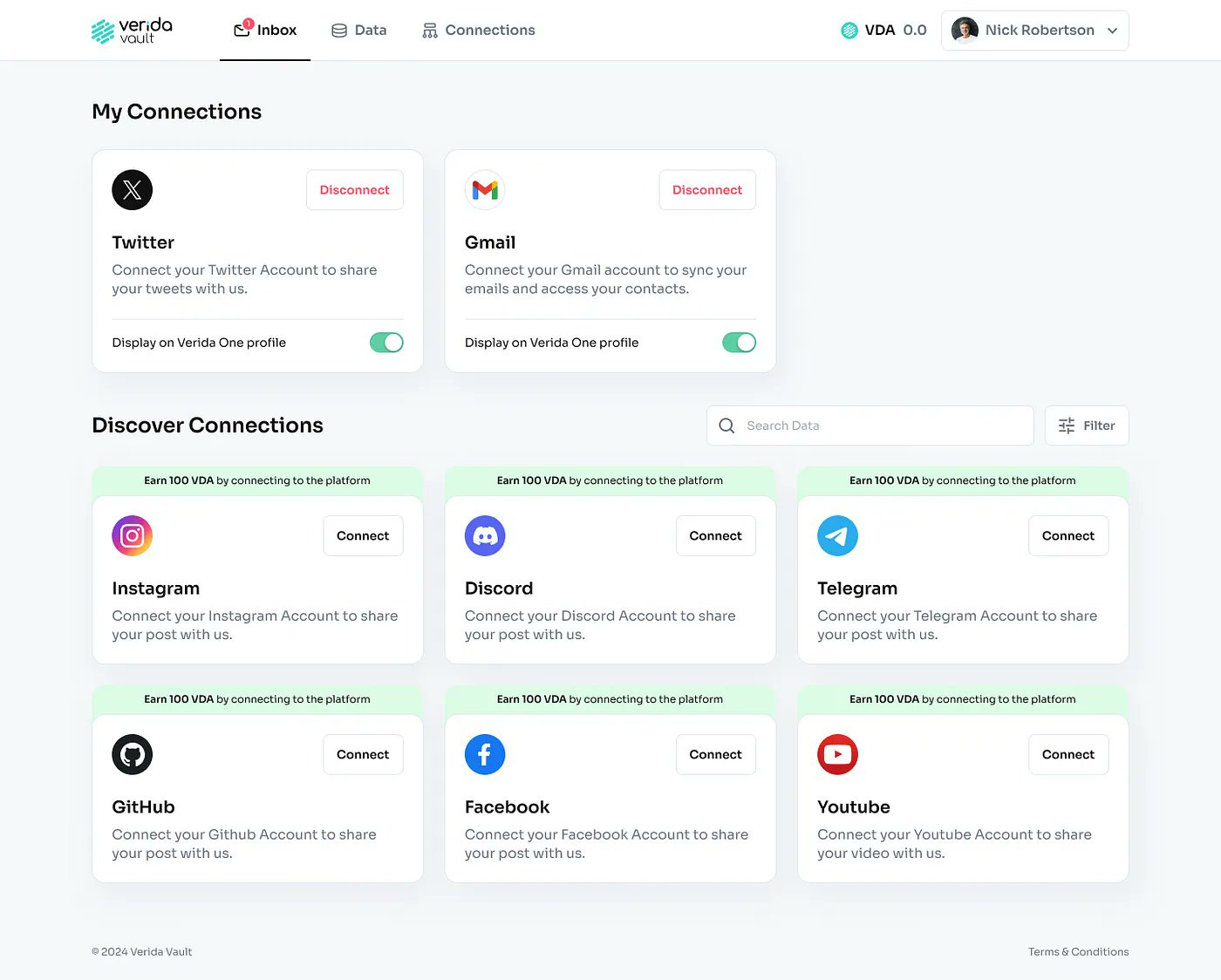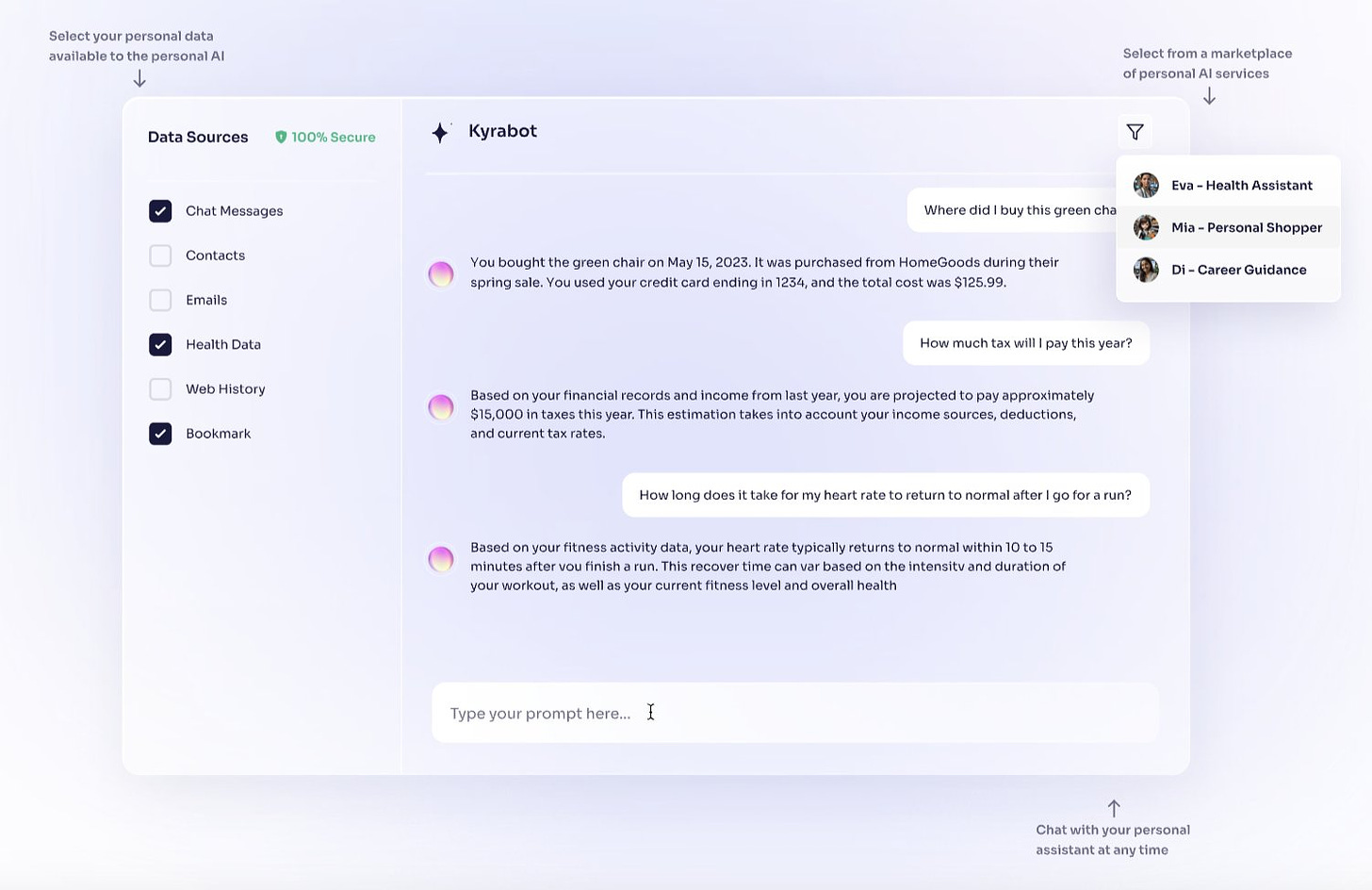Shaping the Dawn of Private AI
An AI future that augments human capabilities whilst preserving individual autonomy
The dawn of privacy-centric artificial intelligence marks a critical evolution in digital technology. Today's decisions regarding AI development will profoundly shape the future landscape of data privacy, individual autonomy, and ethical AI deployment.
We have continuously created information online, the raw data AI can learn from, but this has primarily been given without reciprocity in mind.
Private AI is an evolution toward a new symbiosis between humans and AI.
The shift towards proactive, foundational privacy design in AI represents a significant paradigm shift. This approach integrates privacy-preserving mechanisms into the core architecture of AI systems, establishing a new benchmark for ethical AI development.
Innovations driving the Verida privacy-first approach:
Blockchain-based decentralised identity systems
Secure data vaults for privacy-preserving machine learning
Smart contracts governing AI interactions and data access
Decentralised storage for collective intelligence
Confidential computing for secure knowledge synthesis
Interoperability protocols enabling diverse AI ecosystems
AI agents and automated crypto payments
The cohesive implementation of these technologies can transform sectors ranging from healthcare and finance to urban planning and scientific research. They provide a framework for AI development that balances technological advancement with ethical considerations and individual rights.
The implications of these innovations extend far beyond technical considerations. Prioritising privacy and data dignity at the outset of AI development is an ethical imperative that will fundamentally influence the power dynamics between individuals, corporations, and AI systems in the digital age.
Embracing ethical AI development offers valuable insights into integrating privacy-preserving technologies into the foundations of future AI systems. The ramifications are significant for policymakers, technologists, and ethicists working at the intersection of AI and privacy, likely shaping the discourse on responsible AI development for years to come.
As we stand at this crossroads, our choices will determine whether our AI-driven future enhances or diminishes human dignity and autonomy. We must ensure that the AI systems we create are not just intelligent but also respectful of the privacy and rights of the individuals whose data fuels their development.
Decentralised Identity: The Foundation of Autonomous AI
Using blockchain technology and Decentralised identity systems and Identifiers (DIDs) create a framework for unique, verifiable AI identities. This is crucial for secure, controlled access to sensitive information across multiple systems. They can store all manner of essential information, as well as act as a verifiable credential control point for access to AI.
Consider a healthcare AI assistant accessing medical records across providers. With decentralised identity, it could authenticate to various databases, retrieving only authorised information while preserving patient privacy. This level of secure, granular access is essential for AI systems handling sensitive data across different domains.
Secure Data Vaults: Ensuring Privacy in AI Learning
Secure data vaults protect individual data while allowing AI systems to learn and provide insights. This balance is critical for maintaining privacy in increasingly data-driven services.
A personal finance AI could learn spending habits and offer advice without direct access to raw transaction data. This significantly reduces the risk of financial information breaches while still providing personalised services, addressing a key concern in AI-driven financial technologies.
Smart Contracts: Governing AI Interactions
Smart contracts can encode complex permission systems and ethical guidelines for AI interactions. This self-regulation is vital as AI systems become more interconnected and autonomous.
In smart cities, various AI systems must interact to optimise services. Smart contracts could ensure that, for example, a traffic management AI only shares necessary, anonymised data with other systems. This protects individual privacy while enabling efficient city-wide optimisations, a crucial balance in data-driven urban management.
Decentralised Storage: Distributing Collective Intelligence
Decentralised storage provides a secure infrastructure for collective AI-generated intelligence. This is particularly important for collaborative projects requiring data sharing while maintaining privacy and intellectual property rights.
In multi-institutional research, decentralised storage allows secure sharing of findings and data. Each participant's AI can contribute insights without compromising individual privacy or proprietary information, facilitating broader, more secure collaboration in sensitive research areas.
Confidential Computing: Advancing Secure Knowledge Synthesis
Confidential computing enables AI to generate insights from sensitive data without exposure. This is a game-changer for fields dealing with highly confidential information.
In genomics, AI could analyse vast genetic datasets to identify disease markers or drug interactions without exposing individual genetic data. This balance of data utility and privacy is crucial for advancing medical research while maintaining strict patient confidentiality.
Interoperability: Enabling Diverse AI Ecosystems
Interoperability standards are essential for seamless interactions between diverse AI systems. This is key to creating cohesive, efficient AI ecosystems across different platforms and specialisations.
In business, interoperable AI systems for customer service, inventory, and market analysis could share information seamlessly. This integration enhances overall efficiency and insight generation without compromising data security, a critical factor in modern, data-driven business operations.
Human-Centric Design: Preserving Individual Agency
Human-centric design in AI systems ensures individual control over data access and AI actions. This is fundamental to maintaining user trust and autonomy in an AI-driven world.
A personal AI assistant managing various aspects of digital life requires granular user control. Easy permission management ensures the AI enhances productivity without overstepping boundaries, addressing critical concerns about AI autonomy and user privacy.
AI Agents and Automated Crypto Payments: Enabling Seamless Digital Transactions
A crucial aspect of AI Agent-based systems will be their ability to interact informationally and economically. Integrating cryptocurrency payments into AI agent interactions represents a significant leap towards truly independent and efficient AI ecosystems.
By leveraging blockchain technology and cryptocurrencies, AI agents can engage in automated, secure, and transparent financial transactions without human intervention. This capability opens up a wide range of possibilities:
Microtransactions for Data Access: AI agents could pay small amounts in cryptocurrency to access specific data sets or APIs, enabling more flexible and granular data sharing economies.
Service-for-Service Exchanges: AI agents specialising in different tasks could automatically compensate each other for services rendered, creating a dynamic marketplace of AI capabilities.
Resource Allocation: In distributed computing environments, AI agents could bid for and allocate computational resources using cryptocurrency payments, optimising system-wide efficiency.
Automated Contractual Obligations: Smart contracts coupled with cryptocurrency payments allow AI agents to fulfil complex, multi-step agreements autonomously.
Cross-Border AI Collaboration: Cryptocurrency payments eliminate the need for currency conversion in international AI collaborations, streamlining global AI ecosystems.
This automated crypto payment system between AI agents enhances their autonomy and creates new economic models for AI-driven services. However, it also raises important questions about oversight, accountability, and the potential for AI systems to accumulate and control financial resources. An infrastructure with self-sovereign control over the AI agents will have a significant foundational advantage in the long term when considering AI Agent payment solutions.
Shaping the Dawn of Private AI
The technologies pioneered by Verida highlight a crucial point: our early decisions in developing private AI will define the digital landscape for years to come. From healthcare to urban planning, the potential of privacy-first AI is vast and transformative.
By embracing decentralised identities, secure data vaults, smart contracts, and confidential computing, we're laying the groundwork for an AI ecosystem that augments human capabilities while preserving individual autonomy. These aren't just technical choices—they're ethical imperatives that will balance power between individuals, corporations, and AI systems.
Building privacy into AI from the start is critical. Retrofitting it later is often inadequate or impossible. By prioritising data dignity early, we create a foundation of trust essential for ethical AI adoption and use.
These decisions also set a standard for the entire AI industry, signalling that privacy is a fundamental right in the digital age. They drive innovation in privacy-preserving technologies and pressure all AI developers to prioritise data protection.
Verida's approach proves we can harness AI's power whilst safeguarding personal data and agency. By making the right choices now, we ensure the AI revolution enhances human dignity rather than diminishes it. The future of AI isn't just about smarter systems – it's about systems smart enough to respect and protect human privacy.
Prioritising privacy and data dignity from the outset is fundamental to a positive, genuine, symbiotic AI future.








